Luxor, once known as Thebes, is a treasure trove of history. It boasts some of the world’s most impressive ancient monuments. This Egyptian city has been a center of culture and history for thousands of years.
The city’s name comes from the Arabic word “al-uksur,” meaning “the palaces” or “the fortresses.” It shows the city’s rich heritage. As the world’s largest open-air museum, Luxor City gives a unique look into Ancient Egypt’s glorious past.
Key Takeaways
- Luxor City is known as the world’s greatest open-air museum.
- The city has a rich history dating back to the time of the pharaohs.
- It was formerly known as Thebes, a significant cultural and historical center.
- The city’s name is derived from the Arabic word for “palaces” or “fortresses.”
- It attracts tourists and historians with its ancient monuments.
The Ancient City of Thebes
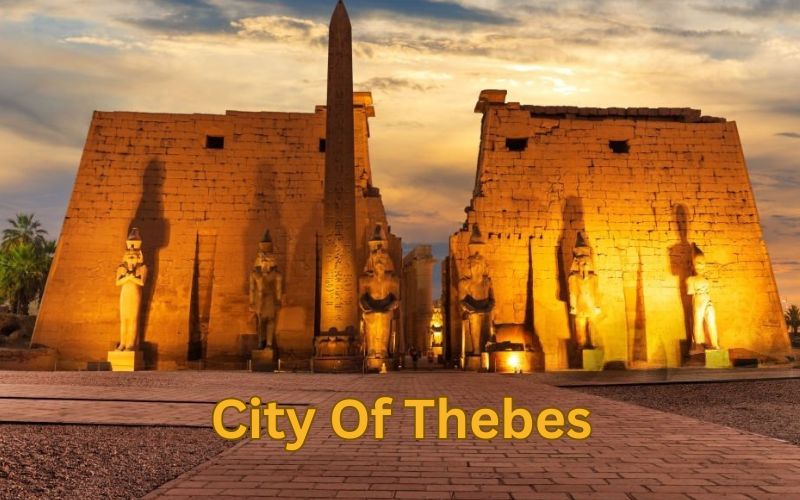
Luxor’s history goes back to the ancient city of Thebes. Its location on the Nile River made it a key place in ancient Egypt. It was a center of culture and power.
From Thebes to Luxor: A City’s Evolution
The city of Thebes became Luxor over time. Its name comes from the Arabic “al-uksur,” meaning “the forts” or “the castles.” This shows the city’s rich history with many temples and monuments.
The Meaning Behind the Name “Luxor”
This name shows the city’s architectural and historical value. It represents the strong structures that were once there.
The Capital of Ancient Egypt’s Golden Age
In Ancient Egypt’s Golden Age, Luxor was the capital. It was home to powerful pharaohs like Amenhotep III, Ramses II, and Hatshepsut. They built many monuments that still stand today.
Key Historical Periods in Luxor’s Development
Luxor’s growth was shaped by several important times. The New Kingdom of Egypt period was its peak. During this time, the city was a hub of politics, culture, and religion. Each dynasty left its mark with temples, tombs, and monuments.
Why Luxor Is Called the World’s Greatest Open-Air Museum
The city of Luxor is filled with ancient temples, tombs, and landmarks. This makes it the world’s greatest open-air museum. It’s famous for its density of historical monuments. These include the Temple Complexes, and the Valley of the Kings.
Density of Historical Monuments
The city boasts an impressive number of historical monuments. The Luxor Temple is a stunning example of Ancient Egyptian architecture. It attracts many tourists.
The Karnak Temple Complex is another highlight. It has many sanctuaries, halls, and obelisks. This shows Luxor’s historical importance.
Preservation of Ancient Egyptian Heritage
The city is dedicated to preserving Ancient Egyptian heritage. Efforts to save its historical sites are ongoing. This ensures future generations can enjoy its rich history.
Recent Archaeological Discoveries
Recent finds near Luxor have revealed new insights into its past. These include unknown tombs and temples. They give us a glimpse into the lives of Ancient Egyptians.
| Discovery | Location | Significance |
|---|---|---|
| New Tombs | Valley of the Kings | Provides insights into Ancient Egyptian burial practices |
| Ancient Temple | Karnak Temple Complex | Expands understanding of Ancient Egyptian religious practices |
| Hidden Chamber | Luxor Temple | Offers new perspectives on Ancient Egyptian architecture |
Exploring Luxor’s East Bank Treasures
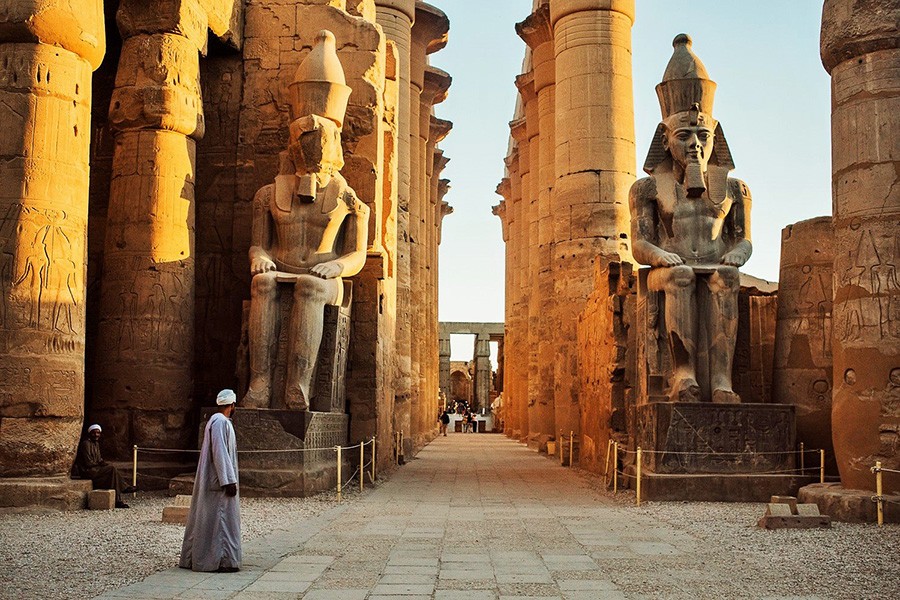
Exploring Luxor’s East Bank is like stepping into a world of ancient grandeur. The East Bank is a treasure trove of historical monuments. These monuments offer a glimpse into the city’s rich cultural heritage.
Luxor Temple: A Monument to Ancient Egyptian Kings
The temple of Luxor is a magnificent structure that stands as a testament to the architectural prowess of ancient Egyptians. Built during the reign of Pharaoh Amenhotep III and later additions by Ramses II, this temple is renowned for its impressive statues and intricate hieroglyphs that adorn its walls.
Architectural Highlights and Significant Features
The Luxor Temple is notable for its well-preserved architecture. It includes the Avenue of Sphinxes, which once connected it to the Karnak Temple Complex. Visitors can marvel at the temple’s grand entrance, massive pylons, and the inner sanctum, which houses a sacred shrine.
- The temple’s construction showcases the advanced engineering skills of the ancient Egyptians.
- The intricate carvings and hieroglyphs provide valuable insights into the history and mythology of ancient Egypt.
Karnak Temple Complex: The Divine Sanctuary
The Karnak Temple Complex is one of the largest temple complexes in the world. It is considered a divine sanctuary. It is a vast archaeological site that includes a variety of temples, chapels, and other structures built over a period of 1,300 years.
The Great Hypostyle Hall and Sacred Lake
The Great Hypostyle Hall is a forest of columns, with 134 pillars that are adorned with intricate carvings and hieroglyphs. The Sacred Lake, a ritual lake, is believed to have been used for ceremonial purposes.
- The Great Hypostyle Hall is an engineering marvel, with its massive columns supporting an enormous roof.
- The Sacred Lake is a serene oasis within the complex, providing a glimpse into the spiritual practices of the ancient Egyptians.
Luxor Museum: Artifacts and Exhibitions
The Luxor Museum is a repository of artifacts found in the region. It showcases a wide range of relics from different periods of ancient Egyptian history. The museum’s collection includes mummies, sarcophagi, statues, and other artifacts that provide a comprehensive understanding of the region’s history and culture.
Visitors can explore exhibitions that highlight the significance of the region in ancient Egyptian times. The artifacts range from everyday objects to grand monumental pieces.
The West Bank Necropolis: Valley of the Kings and Beyond
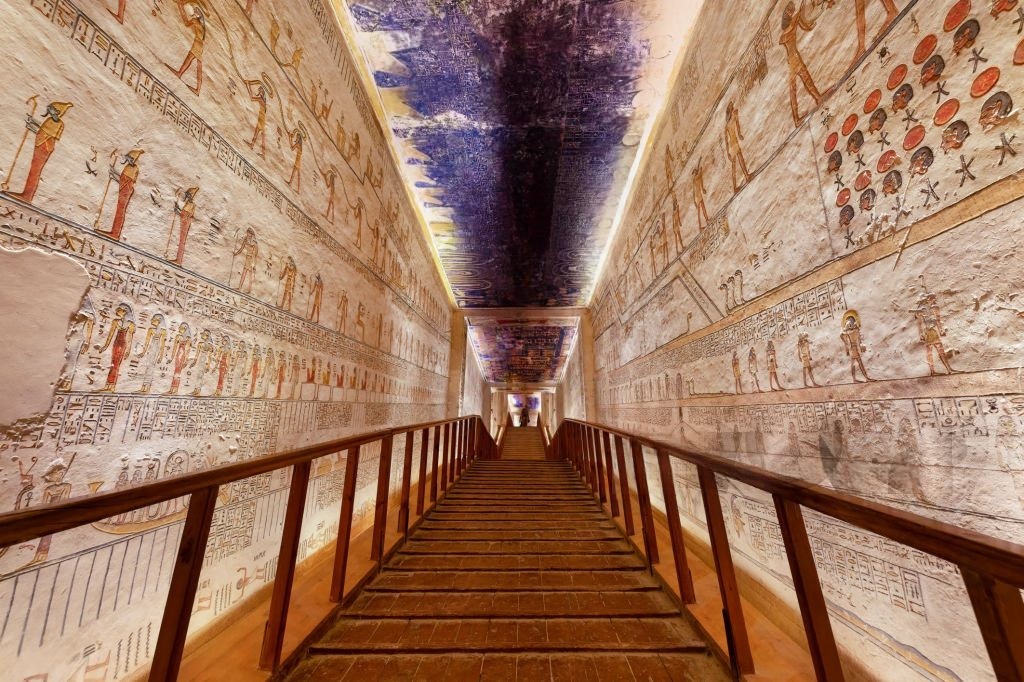
The West Bank Necropolis, home to the Valley of the Kings and the Valley of the Queens, showcases Ancient Egypt’s rich past. It’s a vast burial ground on Luxor’s west bank. Here, many treasures and insights into ancient Egyptian funerary practices have been found.
Valley of the Kings: Royal Tombs and Treasures
The Valley of the Kings is famous for its grand tombs built for New Kingdom pharaohs. These tombs are engineering marvels. They feature detailed paintings and hieroglyphics on their walls.
Tutankhamun’s Tomb and Other Notable Discoveries
Howard Carter found Tutankhamun’s tomb in 1922. It’s one of history’s most famous discoveries. The golden mask of Tutankhamun and other treasures have amazed the world. They give us a peek into this young pharaoh’s life and death.
Valley of the Queens: Resting Place of Royal Wives
The Valley of the Queens is near the Valley of the Kings. It’s where pharaohs’ wives were buried. The tombs here are stunning, with colorful paintings and fancy sarcophagi.
Nefertari’s Tomb: The Sistine Chapel of Ancient Egypt
Nefertari’s tomb is a gem in the Valley of the Queens. Its wall paintings and details are breathtaking. It’s called the “Sistine Chapel of Ancient Egypt” for its beauty.
Notable Tombs and Their Historical Significance
The tombs in the Valley of the Kings and the Valley of the Queens are more than grand monuments. They are historical records. They reveal ancient Egyptians’ religious beliefs, funerary practices, and daily life.
Magnificent Temples of Luxor’s West Bank
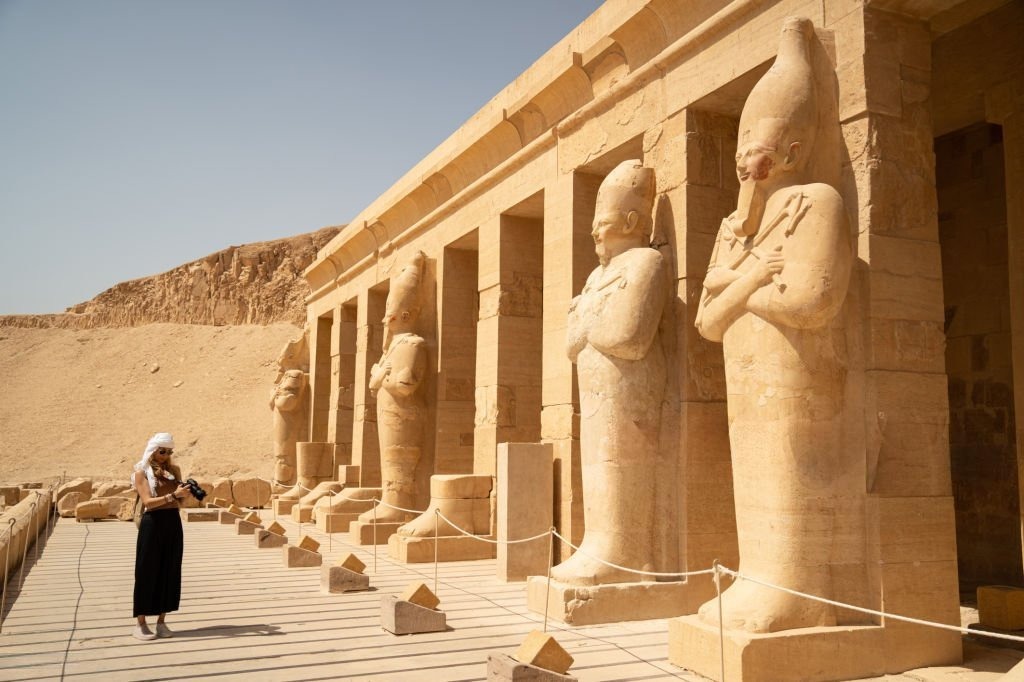
The west bank of Luxor is famous for its stunning temples. These temples show the greatness of ancient Egypt. They were built during different times, highlighting the ancient Egyptians’ skills and beliefs.
Temple of Hatshepsut: The Female Pharaoh’s Legacy
The Temple of Hatshepsut is a marvel on the west bank. It was built by Hatshepsut, one of the few female pharaohs. It shows her success in trade and her architectural genius.
Architectural Innovation and Historical Context
The temple’s design is unique, with terraces and colonnaded halls. It’s a big change from the usual pyramid tombs. It shows Hatshepsut’s goal to make Egypt strong and prosperous.
Ramesseum: Ramses II’s Memorial Temple
The Ramesseum was built by Ramses II. It celebrates his military wins and honors the gods.
The remains of the Ramesseum, including Ramses II’s fallen statue, tell us about his military might and cultural achievements. He was one of Egypt’s most powerful pharaohs.
Colossi of Memnon: Ancient Guardians
The Colossi of Memnon are famous statues in Luxor. They were once at the entrance of Amenhotep III’s temple. Now, they attract many visitors.
Legends and Historical Significance
Many legends surround the Colossi, like the myth they sang at dawn. But, they are still important historical pieces. They show the grandeur of ancient Thebes.
| Temple / Monument | Pharaoh | Significance |
|---|---|---|
| Temple of Hatshepsut | Hatshepsut | Architectural innovation and trade missions |
| Ramesseum | Ramses II | Military victories and cultural achievements |
| Colossi of Memnon | Amenhotep III | Guardians of the mortuary temple |
Luxor: Home to Egypt’s Most Powerful Pharaohs and Deities
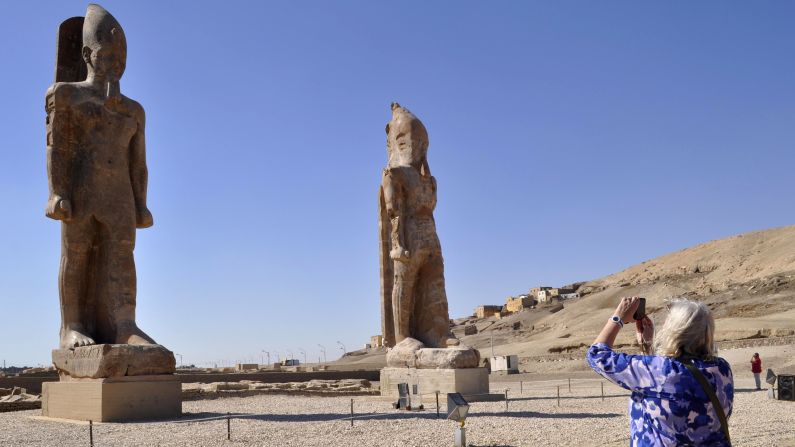
Once known as Thebes, the city was a center of power and worship. It was home to Egypt’s most influential pharaohs, who left their mark through grand buildings and cultural achievements.
Famous Pharaohs Associated with Luxor
Thebes, was important during the reigns of several famous pharaohs. Amenhotep III, Ramses II, and Hatshepsut stand out. They made significant contributions to the city’s architecture and culture.
Amenhotep III, Ramses II, and Hatshepsut
Amenhotep III built the Luxor Temple. Ramses II added to the city’s monuments. Hatshepsut, a rare female pharaoh, succeeded in trade and architecture.
| Pharaoh | Notable Achievements |
|---|---|
| Amenhotep III | Construction of Luxor Temple |
| Ramses II | Contributions to Luxor’s monuments |
| Hatshepsut | Successful trade missions and architectural projects |
Gods and Goddesses Worshipped in Thebes
This city was a key religious center, not just a royal capital. The cult of Amun and other deities played a central role in the spiritual lives of Ancient Egyptians.
The Cult of Amun and Other Deities
The worship of Amun was key in Thebes. Amun, seen as the king of gods, was worshipped alongside others. This shows the complex spiritual world of Ancient Egypt.
Best things to do in Luxor, Egypt
Luxor is a city filled with history, offering many unique experiences. Visitors can explore ancient monuments or sail along the Nile. It’s a place where luxor tours and attractions leave lasting memories.
Luxor Hot Air Balloon Rides
Hot air balloon rides over Luxor’s monuments are unforgettable. As the sun rises, the city’s landmarks shine in golden light. You can see the Valley of the Kings and the Temple of Hatshepsut from above.
Best Companies and Safety Considerations
Choosing a safe and reputable hot air balloon company is key. Balloon Over Egypt and Nile Ballooning are known for their quality and safety. Always check the company’s safety record and read reviews.
Felucca Cruises on the Nile River
Felucca cruises on the Nile River are a must-do. These traditional sailboats offer a calm way to see the city’s beauty. You can take a sunset sailing trip or explore the countryside on a longer cruise.
Sunset Sailing and Longer Journeys
Sunset sailing is a favorite, as it shows the city’s monuments in warm light. For a more relaxed trip, choose a longer felucca cruise. It’s a chance to enjoy the Nile’s calm and local culture.
Sound and Light Shows at the Temples
Luxor’s temples come alive at night with sound and light shows. These shows use music, narration, and lights to tell the temples’ ancient stories. The Luxor Temple and Karnak Temple are top spots for these shows.
Exploring Luxor’s Bazaars and Markets
Visiting bazaars and markets is essential. These places show local culture and offer traditional crafts and souvenirs. You can find unique items like alabaster and textiles, making for a special shopping experience.
Best Times to Visit Luxor and Weather Considerations
Knowing the climate is key to a great trip to this ancient Egyptian city. Luxor’s weather is very hot in summer and mild in winter. This makes choosing the right time to visit crucial for a good experience.
Seasonal Climate Patterns
The region has a desert climate, with very hot summers. Winters are mild and pleasant, drawing in most tourists.
Dealing with the Summer Heat
Summer temperatures can hit over 40°C (104°F). It’s vital to drink lots of water and plan indoor activities during the hottest hours of the day.
Peak Tourist Seasons and Crowd Management
The busiest time to visit Luxor is winter, from December to February. The weather is cooler and better for exploring.
Month-by-Month Visitor Guide
- October to November: Comfortable temperatures and fewer crowds make these months ideal for visiting.
- December to February: Peak tourist season with cool weather, but expect large crowds.
- March to April: Temperatures begin to rise, but it’s still a good time to visit before the peak summer heat.
- May to September: Summer heat is intense; plan for early morning or late evening visits to monuments.
Luxury Accommodations in Luxor
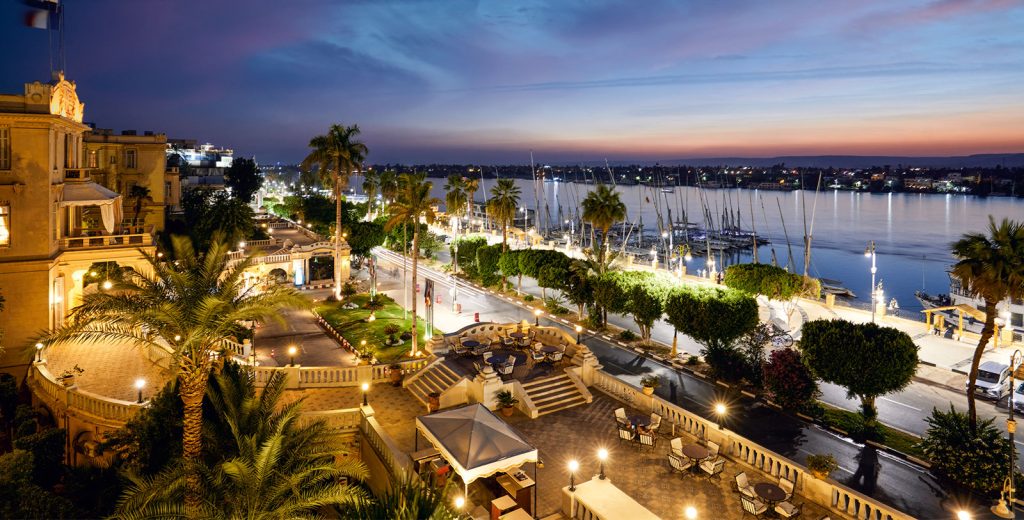
Luxor’s luxury accommodations offer a peaceful retreat for those exploring the city’s rich history. You can find high-end options like riverside resorts, historic hotels, boutique stays, and guesthouses.
Riverside Resorts and Historic Hotels
Riverside resorts in Luxor boast stunning Nile River views and are close to major attractions. These luxury Hotels in Luxor have beautiful gardens, outdoor pools, and top-notch dining.
Top-Rated Luxury Properties
Properties like the Sofitel Winter Palace Luxor and the Steigenberger Nile Palace are highly praised. They are known for their exceptional service and luxurious features.
| Hotel Name | Location | Amenities |
|---|---|---|
| Sofitel Winter Palace Luxor | Riverside | Outdoor pool, spa, multiple dining options |
| Steigenberger Nile Palace | Riverside | Garden, pool, Nile views |
Budget-Friendly Options with Character
For those on a budget, charming guesthouses provide great value. They don’t skimp on comfort or character.
Nile Cruise Ships as Floating Hotels
A Nile cruise is a special way to see Luxor’s ancient sights. Nile cruise ships have luxurious rooms and guided tours. They let you dive deep into the region’s history and culture.
Planning Your Luxor Itinerary
Planning a trip to Egypt’s open museum, can seem hard. But with the right help, you can make a trip you’ll never forget. It is known as the world’s greatest open-air museum. It’s filled with historical sites and activities for everyone.
Egypt Travel Packages to Luxor
Combining Luxor with Other Famous Landmarks in Egypt
A trip that includes Luxor and Aswan offers the perfect balance of history and natural beauty. Traveling by train or Nile cruise lets you enjoy the countryside while experiencing the grandeur of ancient sites and the calm charm of the Nile. This pairing creates a complete Egyptian adventure.
Navigating Luxor International Airport and Local Transportation
When you arrive at Luxor International Airport, you have many ways to get to your hotel. Taxis, private transfers, and hotel shuttles are all available. In the city, you can use taxis, tuk-tuks, or rent bicycles to get around easily.
Conclusion
Luxor, once known as Thebes, continues to captivate travelers with its deep history and cultural significance. Its temples, tombs, and monuments highlight Egypt’s glorious past, offering an unmatched journey into the wonders of ancient civilization.
This timeless destination combines history, architecture, and natural beauty, making it one of the most fascinating places to visit. Step into the heart of Egypt’s heritage and let its treasures enchant you for a lifetime.
Book your Egypt tours now with Touring in Egypt and experience the magic for yourself!
